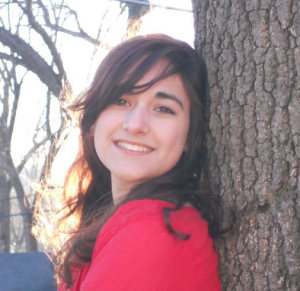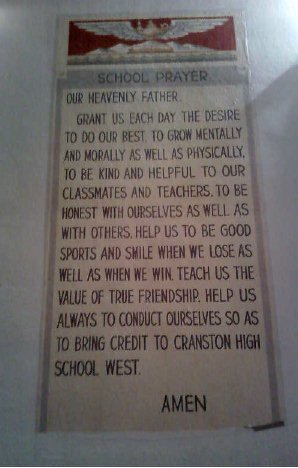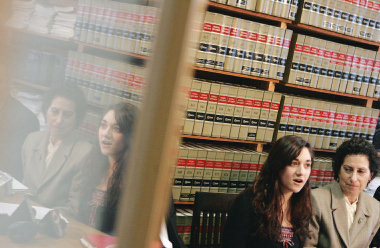Jessica

By Monica Miller
UPDATE January 11, 2012: Jessica Ahlquist has won her lawsuit against Cranston High School West regarding the religious prayer banner hanging in her school. Read the AHA’s press release on the case.
“I don’t feel that brave,” explained the young humanist, Jessica Ahlquist, as we sat down for the Saturday Banquet at the American Humanist Association’s annual conference in Boston, Massachusetts. Ahlquist, a sophomore at Cranston High School West in Rhode Island, recently initiated a federal lawsuit against her school in the District Court of Rhode Island for displaying a religious prayer in the form of a banner in the school’s auditorium.
 According to the complaint in Ahlquist v. City of Cranston filed on April 4, there has been an 8-foot high prayer mural displayed on the wall in the auditorium of Cranston High School West for nearly 50 years. Adopted as the official school prayer of Cranston West around 1960, the prayer begins by asking “Our Heavenly Father” to grant students the desire to do their best, to help them grow, be kind, be good sports, and the like. The lawsuit alleges that the display of the prayer violates Ahlquist’s First and Fourteenth Amendment rights. And, according to Supreme Court precedent, it does
According to the complaint in Ahlquist v. City of Cranston filed on April 4, there has been an 8-foot high prayer mural displayed on the wall in the auditorium of Cranston High School West for nearly 50 years. Adopted as the official school prayer of Cranston West around 1960, the prayer begins by asking “Our Heavenly Father” to grant students the desire to do their best, to help them grow, be kind, be good sports, and the like. The lawsuit alleges that the display of the prayer violates Ahlquist’s First and Fourteenth Amendment rights. And, according to Supreme Court precedent, it does
In 1962, in Engel v. Vitale, the Supreme Court held that “the constitutional prohibition against laws respecting an establishment of religion must at least mean . . . it is no part of the business of government to compose official prayers for any group of the American people.” Public schools are considered “arms of the state” and by displaying this official prayer where Ahlquist has been required to regularly attend school-sponsored programs, Cranston High School West is in direct contravention of the First Amendment to the United States Constitution.
Throughout the American Humanist Association conference, fellow humanists applauded Ahlquist for her bravery in perusing this lawsuit against her school. Ahlquist later elaborated why she doesn’t see herself as a hero explaining, “When I first heard about the issue, I found it very black and white. I assumed everyone would agree that it was a violation.” However, Ahlquist continued, “When I realized that people wanted to keep the prayer and refused to acknowledge that it was unconstitutional, I decided I needed to speak. For me, this has always been something that needed to be done. It’s always strange when people call me a hero. All I’ve ever wanted to do is the right thing.”
 In this case, “doing the right thing” has had its costs. The morning after the lawsuit was filed Ahlquist “walked into homeroom and immediately sensed that [her] reputation had changed.” She informed me, “People turned to stare at me and gossiped with their friends. During the Pledge of Allegiance that morning, my classmates turned and yelled ‘UNDER GOD’ at me.” Since then, Ahlquist has faced similar challenges both in and out of school.
In this case, “doing the right thing” has had its costs. The morning after the lawsuit was filed Ahlquist “walked into homeroom and immediately sensed that [her] reputation had changed.” She informed me, “People turned to stare at me and gossiped with their friends. During the Pledge of Allegiance that morning, my classmates turned and yelled ‘UNDER GOD’ at me.” Since then, Ahlquist has faced similar challenges both in and out of school.
The Internet, which in recent years has become a popular outlet for teenage bullying, has once again provided a forum for particularly discriminatory comments. One specific commenter exclaimed, “It was by the grace of God that this despicable little monster of a girl has the freedom to express her anti-beliefs and nationally broadcast her extreme tolerance: the atheist way. I try really hard to be a good Christian, but this is just too much. This is what happens when kids don’t get discipline, and when parents are deadbeats. Boo these people, I hope they lose their homes.” Ahlquist, not letting comments like these bring her down, responded, “This one actually made me giggle.” It is Ahlquist’s grace in the face of this type of public intolerance that has made her such a hero in they eyes of other humanists.
Ahlquist’s advice to others is “not to be afraid.” Through attending conferences such as the American Humanist Association’s, as well as working with national student groups such as the Secular Student Alliance, Ahlquist has been able to find support for her views. She encourages other young atheists to do the same. “I would advise any young atheists out there to set up a group where nonreligious teens can make friends, do community service projects, and change the negative image that many people have of atheists,” Ahlquist said. “Coming out as an atheist publically is scary, but absolutely necessary. ‘Atheist’ has become such a taboo word that many people see us as evil. It is often difficult to be a minority, but it is very important that we stop hiding and work together. Just remember that you’re not alone!”
Sure enough, Ahlquist has not been alone in her fight to remove the prayer from the school auditorium. Fellow student Taylor Grenga joined Ahlquist at the American Humanist Association conference and has provided support for Ahlquist throughout the early stages of the litigation. According to Grenga, Ahlquist started a Facebook group about the school prayer “which got really big.” Soon after, Grenga “volunteered to be a student representative on the subcommittee in charge of making a recommendation to the school committee about the prayer.” Grenga, also a self-identified atheist and humanist, has faced similar challenges coming out as an atheist in her predominantly Catholic community in Rhode Island.
“As an atheist, it’s easy for people to assume that I don’t have morals, but I do. You don’t need to be religious to be a good person, and humanism emphasizes that.” Notwithstanding these challenges, Grenga accompanied Ahlquist to express her objection to the prayer to the School Committee of the City of Cranston. “Before the lawsuit was officially filed we were just the two girls that were against the prayer,” Grenga said. Now, Grenga observed, the media is “full of really mean comments, and [Ahlquist] actually got hate mail sent to the school.”
In spite of this adversity, Grenga maintains, “If there’s something you feel strongly about, you should stand up for it.” By standing up for what they believe in, Ahlquist and Grenga have demonstrated tremendous bravery and courage.
We are hopeful that the heroic measures taken by these young girls will inspire other humanists to follow suit. Such measures are necessary to uphold the guarantees of the First Amendment and maintain the wall of separation between church and state.
Monica Miller is the spring extern for the Appignani Humanist Legal Center of the American Humanist Association. She is a second year law student at Vermont Law School and received her MPA from Columbia University.
